六年级英语下册 Unit 10 I’d like some noodles 精品课件 鲁教版
文档属性
| 名称 | 六年级英语下册 Unit 10 I’d like some noodles 精品课件 鲁教版 | 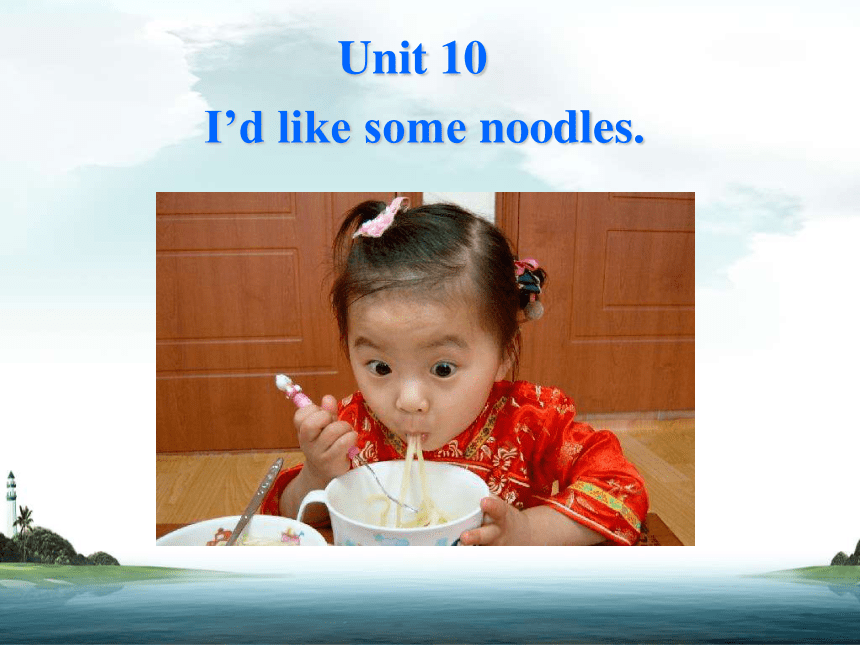 | |
| 格式 | zip | ||
| 文件大小 | 6.5MB | ||
| 资源类型 | 教案 | ||
| 版本资源 | 其它版本 | ||
| 科目 | 英语 | ||
| 更新时间 | 2013-02-10 20:14:14 | ||
图片预览

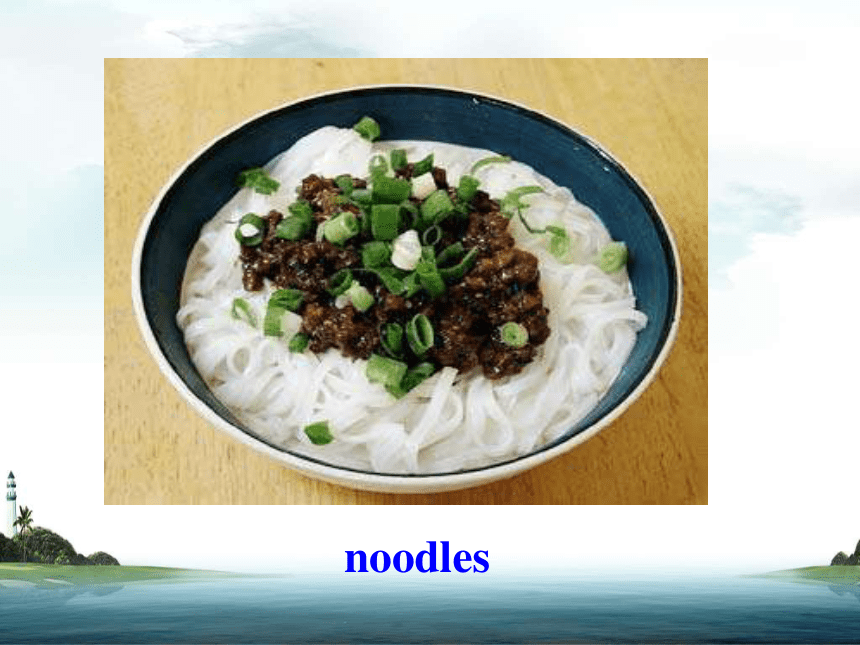
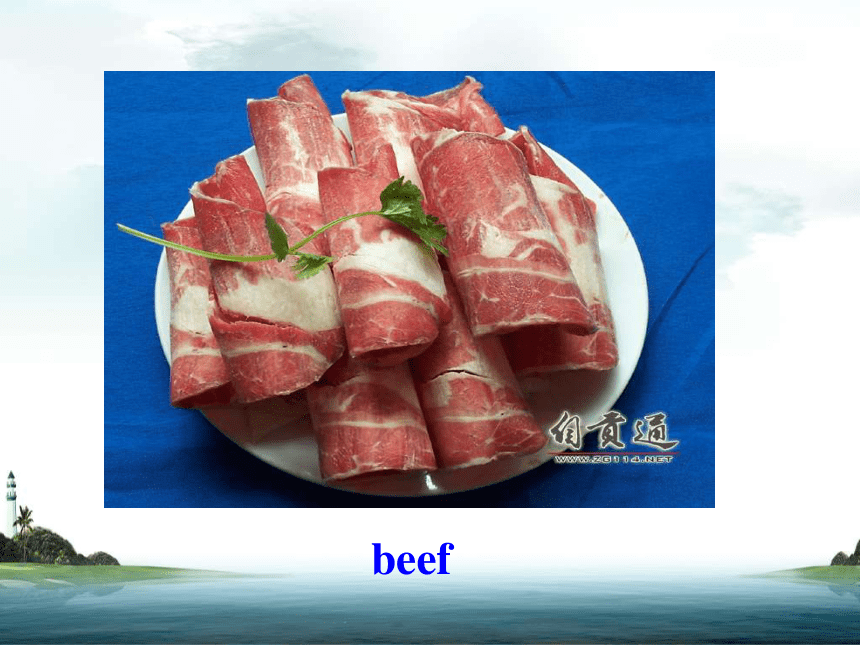
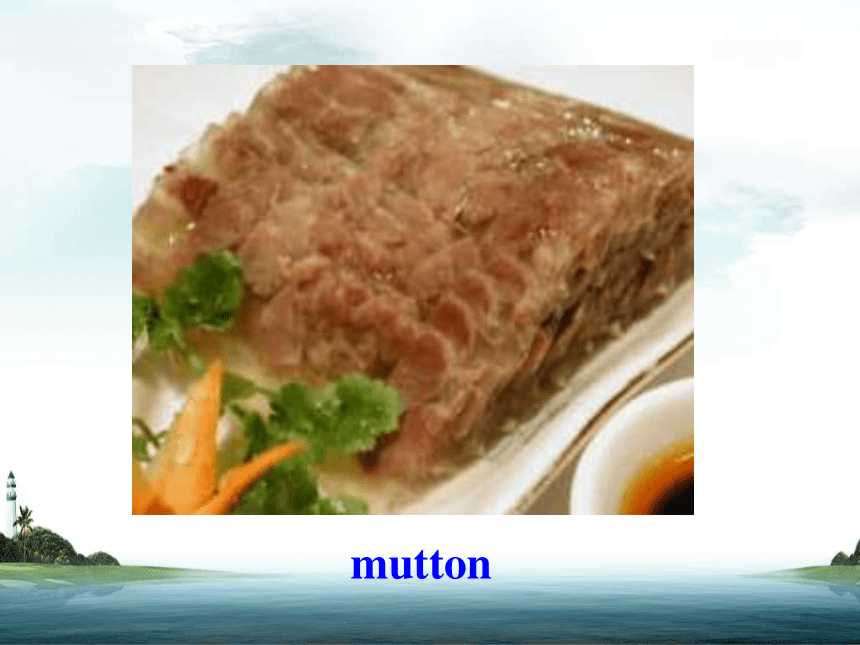
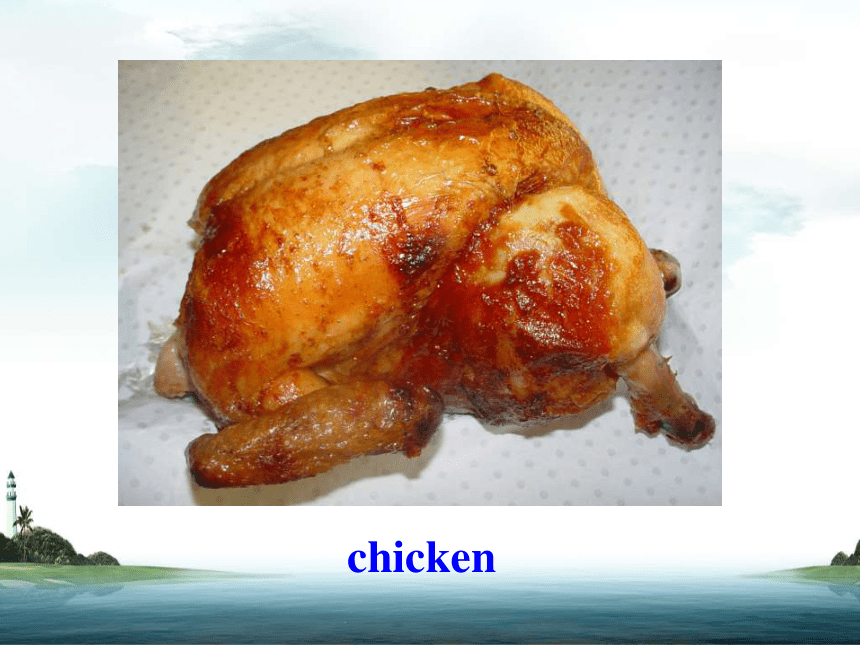
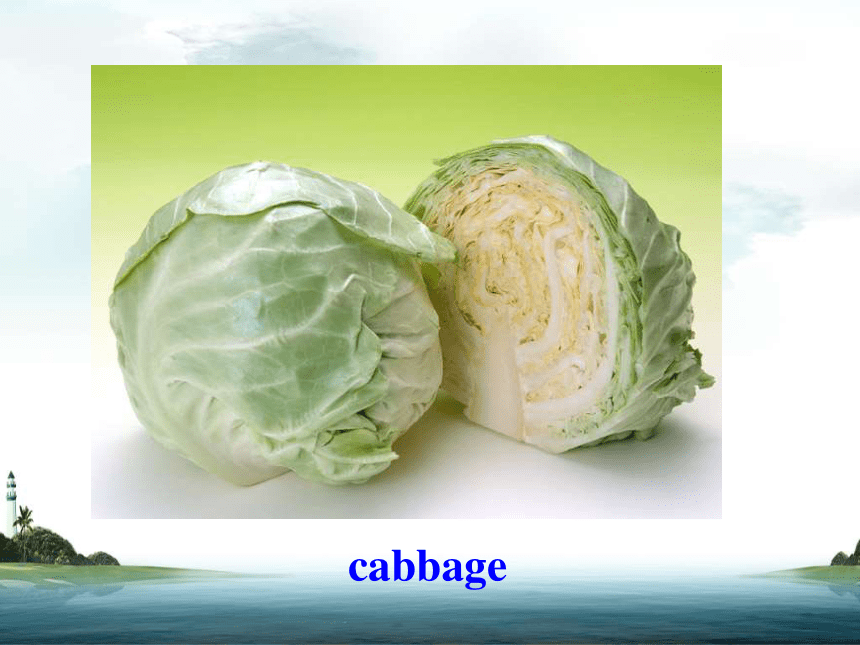
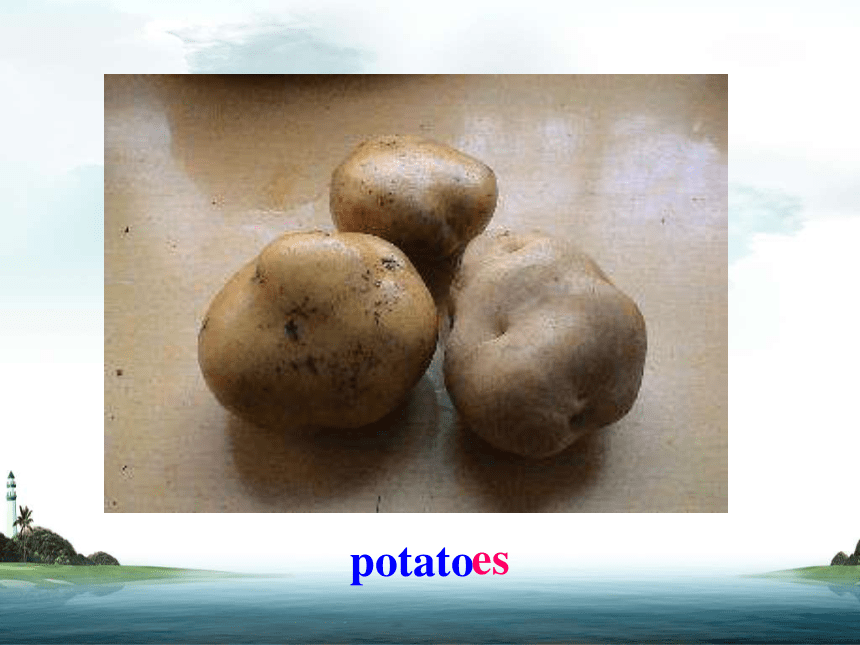
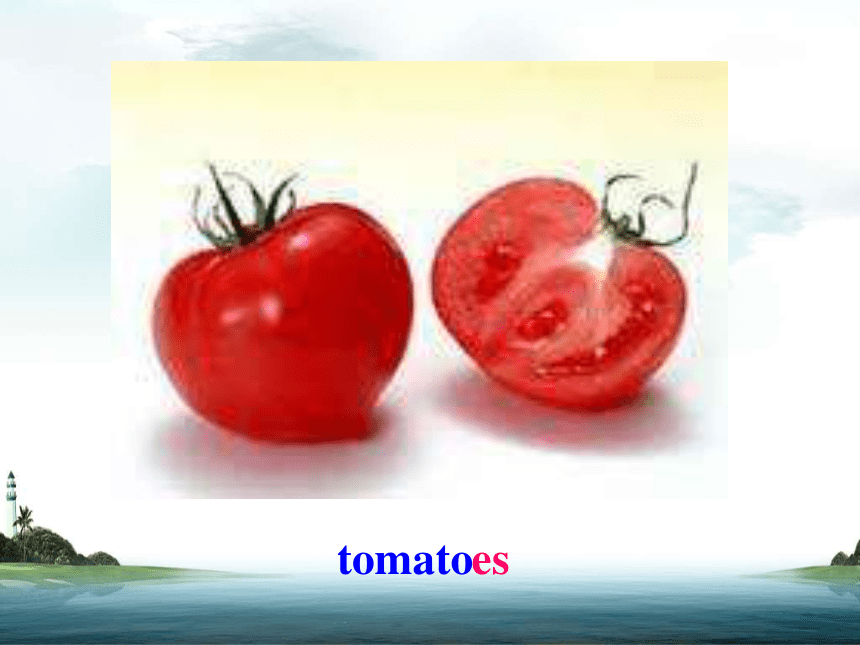

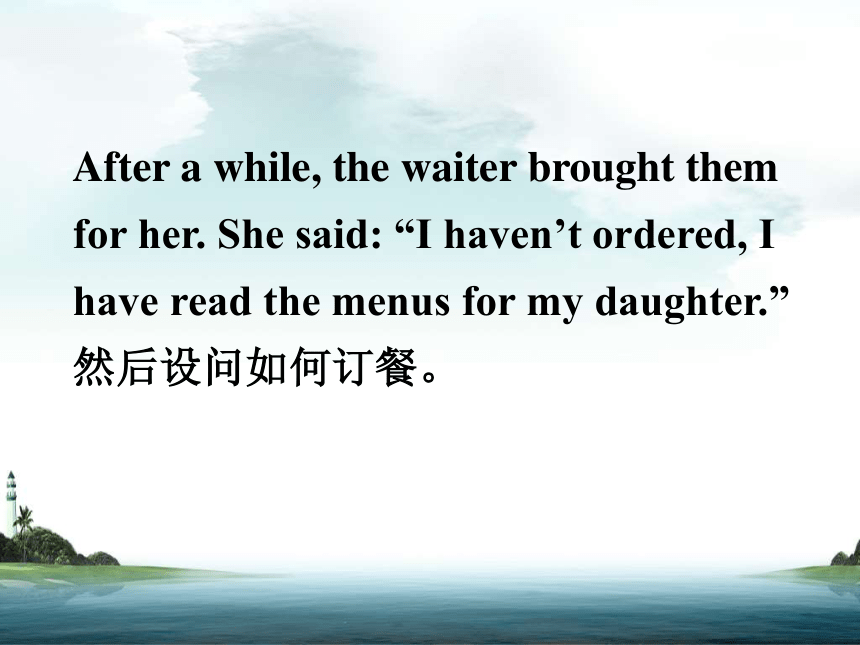
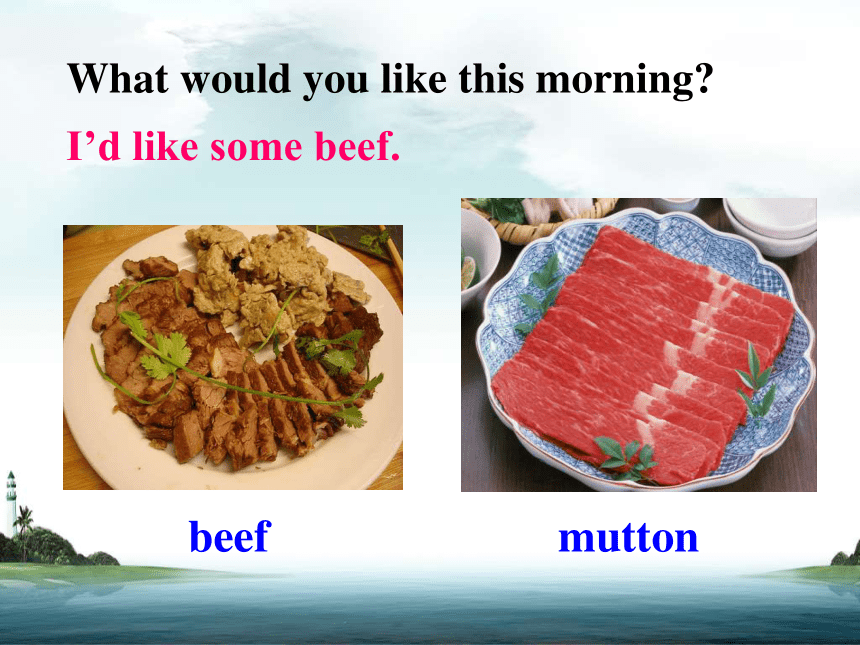
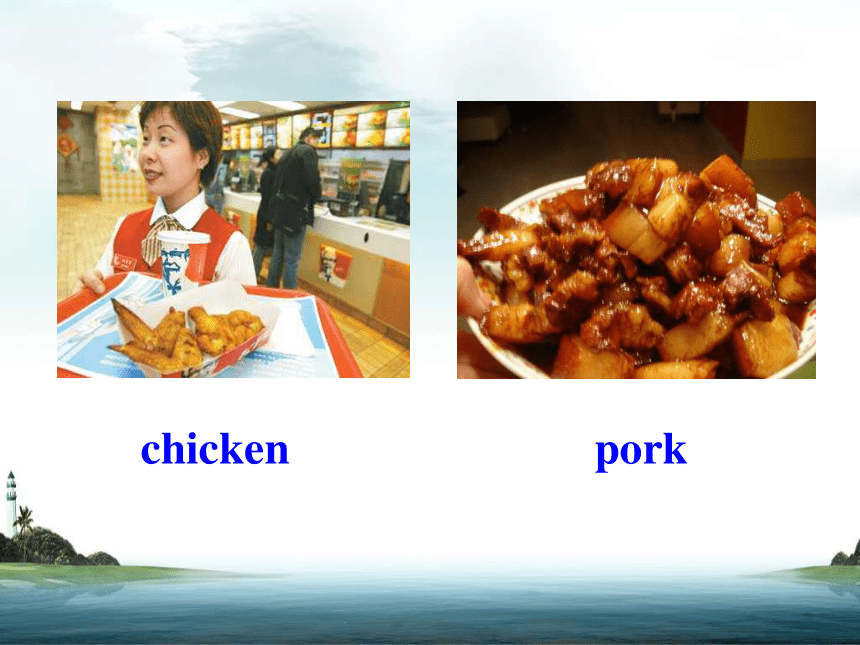
文档简介
课件62张PPT。Unit 10 I’d like some noodles.noodlesbeefmuttonchickencabbagepotatoestomatoesA woman took her daughter to a restaurant, “What can I do for you?” the waiter asked. The answers are like this: hamburgers, ice cream, hot dogs, French fries, salad, tomatoes, broccoli, orange, bananas, strawberries, chicken, beef, sandwiches. After a while, the waiter brought them for her. She said: “I haven’t ordered, I have read the menus for my daughter.”然后设问如何订餐。beefmuttonWhat would you like this morning?
I’d like some beef.porkchickencabbagecarrotstomatoespotatoes orangesapplesa peachgrapes a pearan applea strawberrya bananaan orangeWhat kind of fruit would you like? What would you like? I’d like some bananas.1a Match the words with the foods.1. noodles _
2. beef _
3. mutton _
4. chicken _
5. cabbage _
6. potatoes _
7. tomatoes _cagdfeb√__special 1 __special 2 __special 31b ListeningTapescriptBoy: Hello, I’d like some noodles.
Waitress: What kind of noodles would
you like?
Boy: Beef and tomato noodles, please.Practice the conversation below. Then make your own conversations.1C PAIRWORKA: Hello, I’d like some noodles.
B: What kind of noodles would you like?
A: Beef and tomato noodles, please.当一个名词在另一个名词前充当定语时, 起修饰作用的名词通常用其单数形式。但也有例外: 如果 man 和 woman 作定语修饰另一个名词时应根据被修饰名词的单复数形式作相应的变化。Beef and tomato noodles, please.
请上牛肉西红柿面。Homework配制一份一日三餐健康的菜谱For example:
It’s good to have a glass of milk, some bread, porridge, an apple and an egg for breakfast.bowlsmallmediumlargenoodlessmallmediumlargeA: What size bowl of noodles would you like?
B: I’d like large bowl of noodles. A: What size bowl of noodles would you like?
B: I’d like a small bowl of noodlesa medium bowl of noodlesa large bowl of noodles1. __ noodles 2. __ beef
3. __ mutton 4. __ chicken
5. __ tomatoes 6. __ cabbage
7. __ potatoes √2a Listening√√√√√ I’d like a _____ bowl of noodles.
I’d like _______, ______ and _______ noodles, please.
I’d like a _______ bowl.
I’d like ____ and ______ noodles, please.largechickenpotatocabbagemediumbeeftomato 2b ListeningTapescriptWaiter: What size bowl of noodles would you like?
Boy: I’d like a large bowl of noodles.
Waiter: And what kind of noodles would you like?Boy: I’d like chicken, potato and cabbage noodles.
Waiter: And how about you?
Girl: I’d like a medium bowl.
Waiter: What kind would you like?
Girl: I’d like beef and tomato noodles, please.A: What kind of food would you like?
B: I’d like some noodles/ rice.noodlesricehamburgers2C PAIRWORKA: What kind of vegetables would you like?
B: I’d like some carrots/ broccoli.potatoesbroccolicarrotstomatoesonionscabbagesA: What kind of meat would you like?
B: I’d like some beef.beefmuttonchickenfish 名词可分为可数名词和不可数名词。可数名词有单复数之分, 前面可加数词或冠词。可数名词包括:
(1) 普通名词; (2) 集体名词;
(3) 少数专有名词。Grammar如: boy, book, family 等都是可数名词。 普通名词普通名词是一类人或东西或是一个抽象概念的名称。
如: boy, office, idea, book, mile 等。1. 普通名词受代词或所有格修饰时, 不再加冠词。
如: this (my, every, each, John's) book, our books。
2. 复数普通名词可用 many, few, a few, a lot of 等修饰; 不用 much, little 等修饰。集体名词1. 集体名词是表示由若干个体组成的集合体的名称。
如: family, class, police, cattle, clothing, jewelry 等。
2. 集体名词用 many, few, a few, a lot of 等修饰, 不用 much, little 修饰。可数名词复数变化规则1) 单数名词加 s: students, apples, bags, trees, books, brothers.?
2) 以 s、x、sh、ch 结尾的名词加 es: glasses, boxes, brushes, matches.?
3) 以辅音字母加 y 结尾的名词, 变 y 为 i 加 es: cities, babies, enemies.4) 以 f 或 fe 结尾的名词, 多数变 f 为 v加 es: wives, knives. 但有些词只加 s: roofs, proofs, chiefs.?
5) 以 o 结尾的名词, 有些加 es: Negroes, heroes, tomatoes, potatoes. 其它加 s: radios, zoos, pianos, photos.?6) 不规则名词:
foot → feet, goose → geese,
tooth → teeth, child → children,
man → men, woman → women,
sheep → sheep, deer → deer,
mouse → mice. ?7) 复合名词变复数: 以不可数名词结尾的复合名词无复数形式
如: homework.?
以 man或 woman 为前缀的复名词变复数, 前后两个名词都复数
如: manservant → menservants, womanstudent → womenstudents.不可数名词主要包括两大类: 物质名词与抽象名词。
物质名词表示无法为个体的实物, 如: 食物、水、金属等
例如: rice, meat, bread, water, iron, steel, copper. 不可数名词抽象名词为动作、状态、品质等无法计数的抽象概念
例如: advice, confidence, knowledge, shame, heat, darkness。There are all kinds of food and drink pictures. Let’s divide them into two groups:(1) Countable nouns
(2) Uncountable nouns√dumplingdumplings×soupsoups√×种类鱼肉fishfishes/fi?iz//fi?/fishfishes×ricerices×orange juiceorange juices×porridgeporridges√oniononionsdumplings, hamburgers, French fries, sandwiches,
ice creams, strawberries,
hot dogs, apples, pears, bananas, tomatoes, grapes, cabbages, potatoes, onions, chickens, oranges, eggs …(1) Countable nouns (可数名词):rice, meat, beef, pork, chicken, fish, green tea, salad, mutton, broccoli, soup, porridge, juice, cabbage …(2) Uncountable nouns (不可数名词):ricenoodlesdumplingsporridgebeefmuttonfishchickensoupgreen teamilkorange
juiceonioncabbagepotatoestomatoes…DiscussWhich do you think is healthy food?
Which is junk food (垃圾食品)?Unhealthy!I like chips, hamburger and...Eat healthy food!To keep healthy,
we should eat more ______
we should eat less ______.rice, dumpling, noodle...tomato, cabbage, onion...练习坊请根据以下词汇分类要求, 每组写出3个属于该类别的英文单词。1. Vegetables: ______________________
2. Food: _____________________3. Meat: ____________________
4. Fruit: _________________________
5. Sizes: ____________________ beef, mutton, chicken...apple, strawberry, banana...small, medium, large...
I’d like some beef.porkchickencabbagecarrotstomatoespotatoes orangesapplesa peachgrapes a pearan applea strawberrya bananaan orangeWhat kind of fruit would you like? What would you like? I’d like some bananas.1a Match the words with the foods.1. noodles _
2. beef _
3. mutton _
4. chicken _
5. cabbage _
6. potatoes _
7. tomatoes _cagdfeb√__special 1 __special 2 __special 31b ListeningTapescriptBoy: Hello, I’d like some noodles.
Waitress: What kind of noodles would
you like?
Boy: Beef and tomato noodles, please.Practice the conversation below. Then make your own conversations.1C PAIRWORKA: Hello, I’d like some noodles.
B: What kind of noodles would you like?
A: Beef and tomato noodles, please.当一个名词在另一个名词前充当定语时, 起修饰作用的名词通常用其单数形式。但也有例外: 如果 man 和 woman 作定语修饰另一个名词时应根据被修饰名词的单复数形式作相应的变化。Beef and tomato noodles, please.
请上牛肉西红柿面。Homework配制一份一日三餐健康的菜谱For example:
It’s good to have a glass of milk, some bread, porridge, an apple and an egg for breakfast.bowlsmallmediumlargenoodlessmallmediumlargeA: What size bowl of noodles would you like?
B: I’d like large bowl of noodles. A: What size bowl of noodles would you like?
B: I’d like a small bowl of noodlesa medium bowl of noodlesa large bowl of noodles1. __ noodles 2. __ beef
3. __ mutton 4. __ chicken
5. __ tomatoes 6. __ cabbage
7. __ potatoes √2a Listening√√√√√ I’d like a _____ bowl of noodles.
I’d like _______, ______ and _______ noodles, please.
I’d like a _______ bowl.
I’d like ____ and ______ noodles, please.largechickenpotatocabbagemediumbeeftomato 2b ListeningTapescriptWaiter: What size bowl of noodles would you like?
Boy: I’d like a large bowl of noodles.
Waiter: And what kind of noodles would you like?Boy: I’d like chicken, potato and cabbage noodles.
Waiter: And how about you?
Girl: I’d like a medium bowl.
Waiter: What kind would you like?
Girl: I’d like beef and tomato noodles, please.A: What kind of food would you like?
B: I’d like some noodles/ rice.noodlesricehamburgers2C PAIRWORKA: What kind of vegetables would you like?
B: I’d like some carrots/ broccoli.potatoesbroccolicarrotstomatoesonionscabbagesA: What kind of meat would you like?
B: I’d like some beef.beefmuttonchickenfish 名词可分为可数名词和不可数名词。可数名词有单复数之分, 前面可加数词或冠词。可数名词包括:
(1) 普通名词; (2) 集体名词;
(3) 少数专有名词。Grammar如: boy, book, family 等都是可数名词。 普通名词普通名词是一类人或东西或是一个抽象概念的名称。
如: boy, office, idea, book, mile 等。1. 普通名词受代词或所有格修饰时, 不再加冠词。
如: this (my, every, each, John's) book, our books。
2. 复数普通名词可用 many, few, a few, a lot of 等修饰; 不用 much, little 等修饰。集体名词1. 集体名词是表示由若干个体组成的集合体的名称。
如: family, class, police, cattle, clothing, jewelry 等。
2. 集体名词用 many, few, a few, a lot of 等修饰, 不用 much, little 修饰。可数名词复数变化规则1) 单数名词加 s: students, apples, bags, trees, books, brothers.?
2) 以 s、x、sh、ch 结尾的名词加 es: glasses, boxes, brushes, matches.?
3) 以辅音字母加 y 结尾的名词, 变 y 为 i 加 es: cities, babies, enemies.4) 以 f 或 fe 结尾的名词, 多数变 f 为 v加 es: wives, knives. 但有些词只加 s: roofs, proofs, chiefs.?
5) 以 o 结尾的名词, 有些加 es: Negroes, heroes, tomatoes, potatoes. 其它加 s: radios, zoos, pianos, photos.?6) 不规则名词:
foot → feet, goose → geese,
tooth → teeth, child → children,
man → men, woman → women,
sheep → sheep, deer → deer,
mouse → mice. ?7) 复合名词变复数: 以不可数名词结尾的复合名词无复数形式
如: homework.?
以 man或 woman 为前缀的复名词变复数, 前后两个名词都复数
如: manservant → menservants, womanstudent → womenstudents.不可数名词主要包括两大类: 物质名词与抽象名词。
物质名词表示无法为个体的实物, 如: 食物、水、金属等
例如: rice, meat, bread, water, iron, steel, copper. 不可数名词抽象名词为动作、状态、品质等无法计数的抽象概念
例如: advice, confidence, knowledge, shame, heat, darkness。There are all kinds of food and drink pictures. Let’s divide them into two groups:(1) Countable nouns
(2) Uncountable nouns√dumplingdumplings×soupsoups√×种类鱼肉fishfishes/fi?iz//fi?/fishfishes×ricerices×orange juiceorange juices×porridgeporridges√oniononionsdumplings, hamburgers, French fries, sandwiches,
ice creams, strawberries,
hot dogs, apples, pears, bananas, tomatoes, grapes, cabbages, potatoes, onions, chickens, oranges, eggs …(1) Countable nouns (可数名词):rice, meat, beef, pork, chicken, fish, green tea, salad, mutton, broccoli, soup, porridge, juice, cabbage …(2) Uncountable nouns (不可数名词):ricenoodlesdumplingsporridgebeefmuttonfishchickensoupgreen teamilkorange
juiceonioncabbagepotatoestomatoes…DiscussWhich do you think is healthy food?
Which is junk food (垃圾食品)?Unhealthy!I like chips, hamburger and...Eat healthy food!To keep healthy,
we should eat more ______
we should eat less ______.rice, dumpling, noodle...tomato, cabbage, onion...练习坊请根据以下词汇分类要求, 每组写出3个属于该类别的英文单词。1. Vegetables: ______________________
2. Food: _____________________3. Meat: ____________________
4. Fruit: _________________________
5. Sizes: ____________________ beef, mutton, chicken...apple, strawberry, banana...small, medium, large...
同课章节目录
